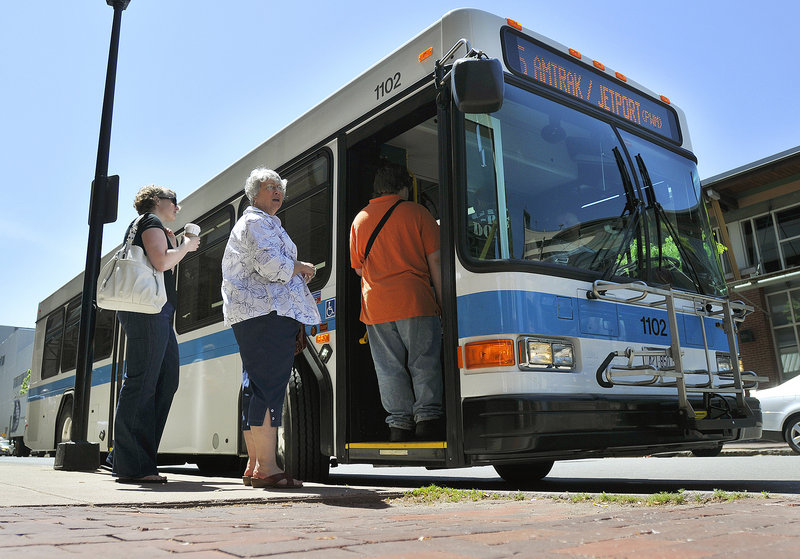PORTLAND – Metro is modernizing its fleet by adding seven new clean-diesel buses that will produce a small fraction of the air emissions of its older buses.
The new buses, which have been phased into service during the past few weeks on routes in Portland, Westbrook and Falmouth, run on low-sulfur diesel fuel and comply with federal emissions standards that were upgraded in 2010.
“We look forward to putting the new buses into service with the knowledge that they are environmentally friendly,” said Metro board President Michael Foley in a news release.
Metro held an open house Wednesday at its headquarters on Valley Street to display one of the new buses.
The gain in air quality from the new buses will depend mainly on what kind of buses they replace, said Lynne Cayting, a staff member in the Maine Department of Environment Protection. “If they’re retiring pre-1990 buses, for example, there would be a significant emission reduction,” she said.
The new buses can cut emissions by as much as 95 percent.
David Redlefsen, general manager of Metro, said the service plans to phase out five conventional buses soon.
Clean-diesel buses are better for air quality, but they aren’t necessarily more fuel-efficient, Cayting said. Clean diesel does reduce ground-level ozone, eliminating air toxins that cause respiratory illness and premature death, she said.
“They use very advanced technology to reduce air toxins and particulate matter, which is a human carcinogen,” she said.
Most of the funding for the new buses came from the American Recovery and Reinvestment Act of 2009. Each clean-diesel bus cost $371,000, about $30,000 more than a conventional bus, Redlefsen said.
Four of the seven buses were purchased with 100 percent federal funding. The other three were purchased with 80 percent federal funding, 10 percent funding from Maine Department of Transportation and 10 percent local funding, Redlefsen said.
Transit agencies in Maine received 13 new buses through stimulus funding and five through Department of Transportation funding. All are scheduled to be in service in the next few weeks.
Duane Scott, a planning director for the Department of Transportation, said the bus funding is part of a long-range plan, Connecting Maine, that includes other environmental initiatives such as replacing street lights with LEDs (light-emitting diodes) and using other new technology.
Redlefsen said the clean diesels look and run much like conventional buses, but Metro riders have been noticing a difference because of their newness and their comfort features, including air conditioning, low-floor access, bike racks and handicapped-access ramps.
“They smell new, look new, are new,” he said. “The ridership has been really welcoming to these buses.”
Staff Writer Colleen Stewart can be contacted at 791-6355 or at:
cstewart@pressherald.com
Send questions/comments to the editors.



Success. Please wait for the page to reload. If the page does not reload within 5 seconds, please refresh the page.
Enter your email and password to access comments.
Hi, to comment on stories you must . This profile is in addition to your subscription and website login.
Already have a commenting profile? .
Invalid username/password.
Please check your email to confirm and complete your registration.
Only subscribers are eligible to post comments. Please subscribe or login first for digital access. Here’s why.
Use the form below to reset your password. When you've submitted your account email, we will send an email with a reset code.